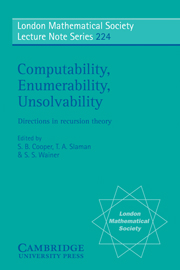Book contents
- Frontmatter
- Contents
- Preface
- Resource bounded genericity
- On isolating r.e. and isolated d-r.e. degrees
- A characterisation of the jumps of minimal degrees below 0′
- Array nonrecursive degrees and genericity
- Dynamic properties of computably enumerable sets
- Axioms for subrecursion theories
- On the ∀ ∃ - theory of the factor lattice by the major subset relation
- Degrees of generic sets
- Embeddings into the recursively enumerable degrees
- On a question of Brown and Simpson
- Relativization of structures arising from computability theory
- A Hierarchy of domains with totality, but without density
- Inductive inference of total functions
- The Medvedev lattice of degrees of difficulty
- Extension of embeddings on the recursively enumerable degrees modulo the cappable degrees
- APPENDIX: Questions in Recursion Theory
Resource bounded genericity
Published online by Cambridge University Press: 23 February 2010
- Frontmatter
- Contents
- Preface
- Resource bounded genericity
- On isolating r.e. and isolated d-r.e. degrees
- A characterisation of the jumps of minimal degrees below 0′
- Array nonrecursive degrees and genericity
- Dynamic properties of computably enumerable sets
- Axioms for subrecursion theories
- On the ∀ ∃ - theory of the factor lattice by the major subset relation
- Degrees of generic sets
- Embeddings into the recursively enumerable degrees
- On a question of Brown and Simpson
- Relativization of structures arising from computability theory
- A Hierarchy of domains with totality, but without density
- Inductive inference of total functions
- The Medvedev lattice of degrees of difficulty
- Extension of embeddings on the recursively enumerable degrees modulo the cappable degrees
- APPENDIX: Questions in Recursion Theory
Summary
Abstract
Resource-bounded genericity concepts have been introduced by Ambos-Spies, Fleischhack and Huwig [AFH84], [AFH88], Lutz [Lu90], and Fenner [Fe91]. Though it was known that some of these concepts are incompatible, the relations among these notions were not fully understood. Here we survey these notions and clarify the relations among them by specifying the types of diagonalizations captured by the individual concepts. Moreover, we introduce two new, stronger resource-bounded genericity concepts corresponding to fundamental diagonalization concepts in complexity theory. First we define general genericity, which generalizes all of the previous concepts and captures both, standard finite extension arguments and slow diagonalizations. The second new concept, extended genericity, actually is a hierarchy of genericity concepts for a given complexity class which extends general genericity and in addition captures delayed diagonalizations. Moreover, this hierarchy will show that in general there is no strongest genericity concept for a complexity class. A similar hierarchy of genericity concepts was independently introduced by Fenner [Fe95].
Finally we study some properties of the Baire category notions on E induced by the genericity concepts and we point out some relations between resource-bounded genericity and resource-bounded random- ness.
Introduction
The finite extension method is a central diagonalization technique in computability theory (see e.g. [Ro67], [Od89], [Le83], [So87]). In a standard finite extension argument a set A of strings (or equivalently of numbers) is inductively defined by specifying longer and longer initial segments of it. The global property to be ensured for A by the construction is split into countably many subgoals, given as a list {Re: e≥ 0 } of so called requirements.
- Type
- Chapter
- Information
- Computability, Enumerability, UnsolvabilityDirections in Recursion Theory, pp. 1 - 60Publisher: Cambridge University PressPrint publication year: 1996
- 13
- Cited by



